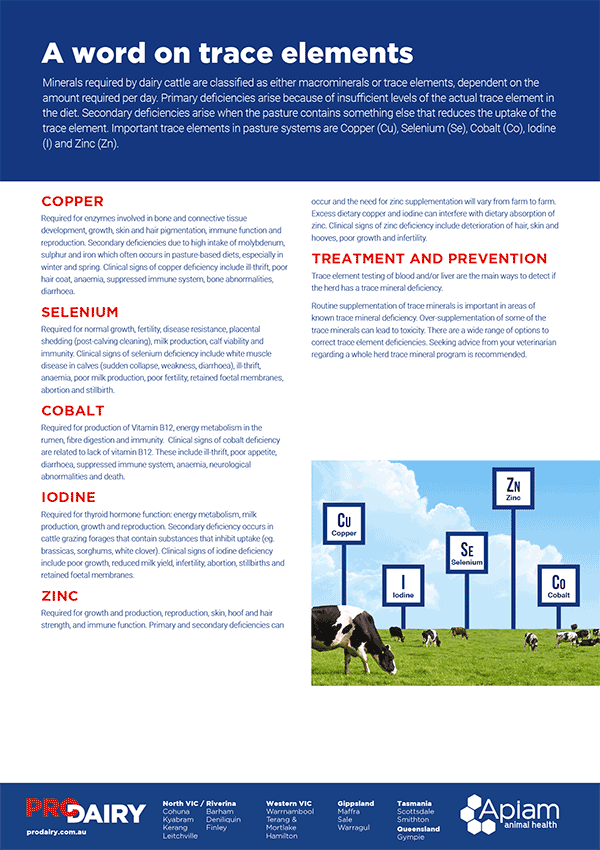Minerals required by dairy cattle are classified as either macrominerals or trace elements, dependent on the amount required per day. Primary deficiencies arise because of insufficient levels of the actual trace element in the diet. Secondary deficiencies arise when the pasture contains something else that reduces the uptake of the trace element. Important trace elements in pasture systems are Copper (Cu), Selenium (Se), Cobalt (Co), Iodine (I) and Zinc (Zn).
COPPER
Required for enzymes involved in bone and connective tissue development, growth, skin and hair pigmentation, immune function and reproduction. Secondary deficiencies due to high intake of molybdenum, sulphur and iron which often occurs in pasture-based diets, especially in winter and spring. Clinical signs of copper deficiency include ill-thrift, poor hair coat, anaemia, suppressed immune system, bone abnormalities, diarrhoea.
SELENIUM
Required for normal growth, fertility, disease resistance, placental shedding (post-calving cleaning), milk production, calf viability and immunity. Clinical signs of selenium deficiency include white muscle disease in calves (sudden collapse, weakness, diarrhoea), ill-thrift, anaemia, poor milk production, poor fertility, retained foetal membranes, abortion and stillbirth.
COBALT
Required for production of Vitamin B12, energy metabolism in the rumen, fibre digestion and immunity. Clinical signs of cobalt deficiency are related to lack of vitamin B12. These include ill-thrift, poor appetite, diarrhoea, suppressed immune system, anaemia, neurological abnormalities and death.
iodine
Required for thyroid hormone function: energy metabolism, milk production, growth and reproduction. Secondary deficiency occurs in cattle grazing forages that contain substances that inhibit uptake (eg. brassicas, sorghums, white clover). Clinical signs of iodine deficiency include poor growth, reduced milk yield, infertility, abortion, stillbirths and retained foetal membranes.

zinc
Required for growth and production, reproduction, skin, hoof and hair strength, and immune function. Primary and secondary deficiencies can occur and the need for zinc supplementation will vary from farm to farm. Excess dietary copper and iodine can interfere with dietary absorption of zinc. Clinical signs of zinc deficiency include deterioration of hair, skin and hooves, poor growth and infertility.
treatment and prevention
Trace element testing of blood and/or liver are the main ways to detect if the herd has a trace mineral deficiency.
Routine supplementation of trace minerals is important in areas of known trace mineral deficiency. Over-supplementation of some of the trace minerals can lead to toxicity. There are a wide range of options to correct trace element deficiencies.
